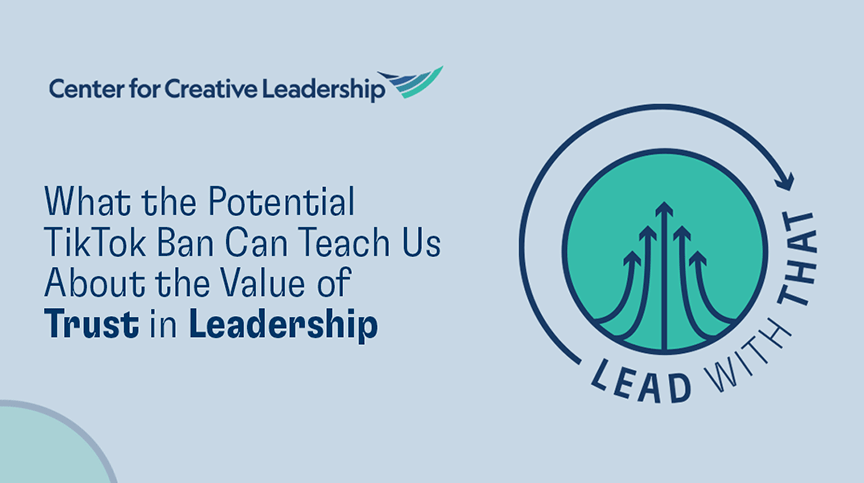- PODCAST
Lead With That: What the Potential TikTok Ban Can Teach Us About the Value of Trust in Leadership

In this episode of Lead With That, Ren and Allison discuss the pending ban of social media platform TikTok, and what impact this decision may have on social media users and creators.
On March 13, 2024, the United States House of Representatives voted in favor of passing legislation to ban TikTok if it’s current owner, ByteDance, does not move to sell their stake in the company within 6 months. As a result, the future of the platform in the US as well as the implications for those who depend on the platform for both income and entertainment alike remain uncertain. While this legislation is primarily about government policy, it highlights from a leadership perspective the important role that trust and transparency play when leaders make decisions that have a major ripple effect on people, whether in an organization or a government.
Listen to the Podcast
In this episode, Ren and Allison discuss the conversations that arose from the pending ban of social media platform TikTok. While the ban is ultimately a government policy decision, the situation raises broader concerns around the importance of trust and transparency in an organization and what the ban would mean for the future. Allison and Ren explore what we can learn about trust when making decision that affect a large number of people, and lead with that.
Interview Transcript
INTRO:
Welcome back to CCL’s podcast, Lead With That. We talk current events and pop culture to look at where leadership is happening and what’s happening with leadership. You sell it or we ban it. That’s essentially what the US House of Representatives said on March 13th after passing legislation that would ban TikTok if its China-based owner, ByteDance doesn’t sell its stakes in the social media platform within 6 months. If the company chooses not to sell TikTok would be prohibited from app stores such as those offered by Apple and Google, as well as web hosting services until a divestor occurs, according to the bill. Now, if ByteDance chooses to divest its stakes, TikTok would continue to operate in the US, especially if the President determines through an interagency process that the platform is no longer being controlled by a foreign adversary. The bill would also require ByteDance to give up control of TikToks’ well-known algorithm, which feeds users content based off of their preferences.
If you’ve ever used TikTok, you know what we’re talking about. And this is just the first step necessary for TikTok to get banned in the US since you likely know the Senate would also need to pass the measure for it to become law, but with several bills aimed at banning TikTok stalled in the Senate, it’s kind of unclear what’s going to happen. Here’s what we do know, though. From a business perspective, the removal of TikTok from the US market would likely disrupt strategies of countless brands and influencers who’ve leveraged the platform to reach younger demographics and just change the business landscape.
For content creators and influencers a TikTok ban could mean a sudden loss of income and visibility, but really just a whole change of what it means to do work and create content. But if you’re listening to Gary Vee talk about it, he’s really thrilled at the prospect of what TikTok would look like when it goes away. But Allison’s giving me thumbs down. So we’re talking about that. And so for us, we get to talk to our very own leadership influencer here at TikTok, and so we’re going to explore, as we do, leadership, leading, talk a little bit about this, maybe some other things, and just get our take on what’s cooking here.
Ren:
So welcome back everyone. I’m Ren Washington, as usual, joined with Allison Barr. Allison, if TikTok was banned, would you still use it?
Allison:
That’s hard for me to answer because… It’s hard for me to answer.
Ren:
You don’t want to incriminate yourself.
Allison:
Well, a ban wouldn’t stop people from using TikTok, right? TikTok users in the United States might look like Facebook users in China. They can VPN or find alternate ways, but I would have to know a little bit more. And honestly, it’s not that I wouldn’t use TikTok, it’s just how much effort is this going to take for me? You know I love TikTok. It’s my probably favorite platform out there in terms of social, but if it’s going to take a lot of effort for me, I probably wouldn’t. So it’s less about me being afraid and more about if I have to do 10 steps to log into my account, then no.
Ren:
So, I mean, we could already go down a rabbit hole around the ease of work, when you’re working with people and leading teams, how simplified can you make a process or complicated can you make a process to sunset something? So maybe let’s not explore what kind of steps would preclude you from using TikTok, but maybe instead explore this idea that if it were easy though in banned, you would, what if it was only 3 steps? TikTok’s banned in the US and you’re like, “Okay, cool, but I still basically only have to push one extra button to engage in my favorite platform.” You then would still do that?
Allison:
No, it depends. It really depends. I don’t know anything about what that would look like. And while I utilize TikTok myself for educational…my platform is educational. It’s been really fun. I’ve made a lot of connections. It’s more creative to me than other platforms, and I’ve generated business, my own personal business on that. And I think that’s why a lot of creators in the kind of space that I’m in use it because you can generate business a lot easier. And so, if the people who I follow are not on there, it’s also a personal use for me. I might not. It depends. It just depends. I’m not sure what it’s going to look like.
Ren:
Well, let’s keep on talking about your experience with TikTok because I think it’s a unique opportunity that we’ve got. We don’t even have to invite a guest onto the show. Like you said, you’re an avid user, avid to preferred platform. You’ve been able to do a lot with it, and I think you’ve done a lot for the visibility of the conversations that we’re having. And then you gave a huge thumbs down when I mentioned Gary “Vee” Vaynerchuk because I’ve heard his commentary on it. He’s like, I think he’s principally excited that the innovation potential of TikTok going away. But do you not like Gary Vee? Or you just don’t like the idea of TikTok going away? What were the thumb downs about?
Allison:
I’m sorry, Gary Vee didn’t mean to give you a thumbs down.
Ren:
I don’t think Gary cares.
Allison:
I’m sure he doesn’t. He’s going to be fine.
Ren:
I think he’s going to be okay. Yeah.
Allison:
I am hesitant to answer that question directly because I realize it’s going to pigeonhole me as well as an avid TikTok user. I do not have the kind of platform that Gary Vee has. He’s got 5 million followers or something like that. But I think there’s an interesting tension point of people speaking on topics on social media who are opinion-based, and you’re welcome to have your opinion, who might not necessarily have the full education to be speaking on said topics. And I have not listened to Gary Vee’s full sermon, if you will, on what you’re talking about.
But I think that’s kind of part of social media’s draw too, is that you can have a voice, and TikTok specifically generates an audience a lot faster than any other platform. So that is inherently the draw. I wasn’t giving, I mean, I guess I’m giving the whole thing a thumbs down. The potential ban, people like Gary Vee or people like me who have a smaller audience or people like Joe Smith who use it for fun to look at puppy videos, which I also do. It’s the reach that you can get on TikTok if you are a business owner is dramatic in comparison to other platforms.
Ren:
Well, maybe this is a great place to dig in any way to stuff that we talk about around innovation or how leadership can kind of spur innovation. Because I internalize now, I didn’t listen to Gary’s sermon either. I don’t know if it was a sermon, it was a clip on LinkedIn, just a comment around him being asked many of the things, what he thinks about the happenings. And I think generally his reflection was less like he has an issue with TikTok, but more like there have always been these technical frontiers where the invoke thing then has kind of gone away and then it’s not crippled anything. It’s actually made things better.
So you raised one facet, the growth of business or access to customer, maybe that quick pathway. I think his premise was he’s excited at what would fill the gap because he’s like all of that engagement… He was saying, “All of that engagement has to go somewhere.” And so he would love to be the one… Who’s going to be that next person to say, “Ooh, I’ve got the place to fill what TikTok offered or what this experience was.” So I think maybe his was more like in who’s going to be next to fill that frontier, that innovation angle.
Allison:
Yeah. And I can appreciate his enthusiasm around that but I think realistically, and again, this is my perspective, I listened to some podcasts, I did some reading as we do before preparing or recording our podcast. I think it’s more likely that Instagram or Meta… Meta is going to be the one that absorbs all of the advertising dollars that TikTok is gaining. So I am sure there will be other platforms that will surface if TikTok gets banned, but I think it’s more likely that Meta is going to benefit the most out of this.
And I think maybe that’s one thing that people don’t necessarily realize, which is understandable, is that at the end of the day, this is about business more so than it is about data. Because if it were about data, we would also be talking about other platforms that leak data and other companies that leak data. So I think, again, it is a little complicated because it is just a little complicated of a topic, but I really do believe at the end of the day, Instagram and Facebook would gain more power and control for advertising dollars. And that’s more what this is about.
Ren:
Yeah. Well, there’s 2 things there that I’d love to chase. One would be, I hear you on the idea of where the money might go, but where are the people going to go because they’re not currently using those spaces the way that they’re using TikTok? And so I’d be wondering whatever next platform is next. But the more interesting thing that I’m curious about, and I agree with you 100%, I think this is not a data issue. This is a power issue. And I’m like, “Who do you think the ban is for?” I might have buried the lead people, but part of this legislation is that ByteDance has got to give up their algorithm. Give it to who?
Allison:
Right? Exactly.
Ren:
Do you think that is an altruistic effort on our behalf? I do not think anyone, real power brokers are thinking about my well-being during this whole thing. So who do you think the ban is for anyway? Have you heard much about who the ban is for?
Allison:
Well, I think it’s just a much bigger conversation, honestly. The one thing I do want to say before I answer that is that Instagram Reels, it is a close second to TikTok, the user function that it offers is not similar to TikTok, but it’s close. So again, I do not think people are going to jump on a new app. I think they’re going to go to, they’re going to stay on Instagram. Most people who are like these large creators on TikTok have Instagram already. So I don’t think we’re going to see some new… We might see some smaller apps get created, but I don’t really think this is going to be a big shift into some new innovative space. I just don’t.
If we think about how people were up in arms about Elon Musk buying Twitter, some people were and threatening to leave Twitter and all of that, no, they didn’t really thinking like, “Well, new apps will be created.” And those conversations tend to happen anytime there’s a big change coming, “We’ll just do something else.” But the majority don’t. The majority don’t. So I think people will just go to Instagram or stay on Instagram rather.
Ren:
Okay, well let’s just use this here as a thought experiment. You’re in an organization as a leader who is faced with this very problem that you are, where they’re looking at the business model, they’re looking at the bleeding edge of innovation and someone saying, “Look, there is no next thing here. We either do this thing or we put our efforts into this other platform.” If you’re trying to lead innovation in a space like that, how would you lead yourself to think differently about the future of: If TikTok gets banned, what’s next?
Allison:
Is your question, what I would do if I was working for TikTok or something or somebody who could-
Ren:
No, how would you… You raise an interesting, you’re someone who’s on the front lines actively engaging the platform and you’re telling me that TikTok is boo hoo, people are going to use Instagram. And I’m saying, “Well, what if something new were there?” And you’re kind of like, “That’s not going to happen.” And so let’s imagine that you’re in an industry, as so many of the people who go to our programming are, leaders or anyone listening, and they’re trying to lead people who are looking at them saying, “Look, I’m on the front lines. I use this platform every day. If it goes away, I’m going to use something else. Don’t tell me to change or don’t tell me that things are going to change,” and then we don’t even have to get theoretical. What would convince you that there would be a better frontier?
Allison:
Okay, well, I think there’s 2 things to talk about, and one is, and let me be very clear before I say this. I am not one of those people on TikTok who makes 6-figures by being on TikTok. I’m talking about people who advertise and people who do have these large platforms who it’s their primary source of income, it is their primary source of income. Now, I would be thinking about that and okay, that’s what stands out the most truly from TikTok to these other platforms. Instagram does not pay their creators. LinkedIn does not pay their creators. Twitter does not pay their creators. You can get brand deals, but that’s different. Like TikTok, I do get paid a very small amount for my platform, but it is income. It’s still income. So that’s where I’m going to be looking is what is actually the biggest source of frustration here as it pertains to business. And it is that people are making money off of this platform. So what can I do about that if I’m a business owner?
Ren:
So maybe then if I were to boost the value proposition of content creator compensation, how about that alliteration, then that could be, it’s like, okay, the ease of use for you I heard out loud early in 10 steps, not even worth using the platform that I like right now. I mean hyperbole if I’m teasing, but it’s like, ease of use I think. And then 2, maybe compensation. And I was just, sorry, I don’t know if you saw, I was… Do you know who Saquon Barkley is? Football player?
Allison:
No.
Ren:
Okay. No sweat. I barely watch football these days anymore. I wish I still did. But anyway, he running back for an offensive player for the New York Giants went, just got traded or left there to go to the Philadelphia Eagles. And I was reading this post around on LinkedIn, someone comparing that to, “Did Saquon leave because of X, Y or Z?” And then the first thing was compensation. And I thought, “Well, I don’t know a running back who’s getting paid millions of dollars has compensation first on his value proposition.” But it is something that tends to come up a lot. And then when we think maybe around how you can spur innovation, I guess I’m always coming back to what are we incentivized to do?
And so maybe then as a creator, I can incentivize you to engage in my platform by paying you or fly you into the Washington D.C. Capitol Hill to testify on my account, and maybe I get you a little cut back and have a nice dinner in Foggy Bottom like TikTok influencers have been done. Have you been invited to D.C. to testify?
Allison:
Not yet. Sadly. I would politely decline if that was an option, but I think it’s bigger too. Yes, it is the compensation, but it is also that the way that TikTok functions as a platform is that the reach that you can get is much bigger. And so if you are a business, if you’re a small business owner, small businesses have thrived with TikTok in the US I’m talking about the US specifically. Small businesses have thrived because the algorithm operates as such to reach a broader audience, you can get reach quickly. And that’s what happened to me. I had no idea, did not expect that to happen, but I’m not a small business owner. As a first job my job is obviously working at CCL and I just use it for educational purposes and to educate people, but there are people who use it to expand their business and it works. So again, you asked about innovation. If I were in that space, how could we create something that generates that type of broad reach because Instagram and Facebook don’t have the same capability.
Ren:
Or maybe they don’t have the access to the same information. Because I was just thinking logistically, how could it advantage you in a local context, likely by pinging the app off of your whatever, GPS locator that you have to say yes to enable the app? I don’t know. I don’t have TikTok, but I mean it-
Allison:
I don’t think you have to say yes to that.
Ren:
Yeah? But how does one get local access? That’s a curiosity to me. That’s an interesting premise that I wonder, you find that you get more local exposure or you experience access to more local things than not national or something?
Allison:
As I understand it, the more videos, we’re going to use puppies, because I absolutely get a lot of puppy videos on my For You page, there’s 2 options when you log into TikTok, there’s a For You page, and then there’s a People You Follow page. The For You page is what TikTok suggests for you. So it’s not necessarily people you already follow. And because I continually like, double tap on those puppy videos, I get a lot of dog videos suggested to me, and I do not mind that, right? So if you were to log on and constantly search out, “football running backs”, you would get pushed running back content.
The second part of it is that it is a geo-focused app. And if I were to tag my posts in Colorado Springs, which sometimes I do, and that’s intentional, I know that it will push content to people who disclose that they are in Colorado Springs.
Ren:
Yeah, okay.
Allison:
I know that. So I can also tag that I’m in the United States. You can also be that broad. So I think it works in a couple of different ways. And then of course, hashtags are a part of it too, but primarily if you’re following and liking content that is running backs in the NFL, that’s what you’re going to get. You’ll get people talking about running backs, you’re going to get people who are running backs, et cetera.
Ren:
Yeah. Well, thank you for the quick tutorial on the TikTok. I had a sense of the algorithmic base like you like these things, we give you more of these things. Yeah. I wonder from a content creator’s standpoint too, especially from someone who uses it for educational purposes, I think there are a lot of slippery algorithmic slopes out there that can all of a sudden lead someone from a well-meaning search to a very weird space. And I think there are actual concerns about managing access to certain information for certain populations and then taking that into-
Allison:
You’re going to have to be more specific, sir. Come on now. What do you mean?
Ren:
Well, I don’t know. I think-
Allison:
What is the slippery slope? As someone who’s not on social media, what do you see as the slippery slope?
Ren:
I wish I had enough verification, and this is something that I’m curious to get your perspective on. For someone who does not engage in there, it’s easy for someone outside of the realm to hear about how some AI models are on the YouTube for kids or something. We’ll start off with these images that get more visual connection. I think there was, God, what is this thing called? See now you’re calling me out here, make me think about something that… Gosh, JokerGate or something? It was like an image of 3 Disney characters. And then all of a sudden because of whatnot, it ended up at this trail of one video leading to another video, leading to another video and this cascade of information.
And then I think there is a concern generally as we do around what kind of information is exposed to young people and at what level? And TikTok is an interesting access point for a lot of people. And I think that’s maybe just one small example of some potential concerns that people have with these apps. But I was just wondering your point of view for someone who uses these things, and maybe then too, thinking about this idea of in an organizational context where we think as a leader, “Hey, only certain parts of the organization need to see in this information or should be exposed to this information.” I guess where do we draw the line on access and responsibility?
Allison:
Yeah, that’s tricky, right? So if part one of what you were saying was around children and what they see, we could really rabbit hole on that, right? Social media is not the only place where they can find things. A Google search can, if they’re curious, right, hop on Google? Any child can Google a lot of things that we probably don’t want them to see. So yes, TikTok, like any other platform as I understand it has, do you know when they sort of gray, have you seen this? They’ll gray out the content and it will say, “Sensitive content,” or, “18 plus.” But again, as I understand it, you can still click on it. It’s just a warning. It’s like a content warning. You can still, and that’s Instagram, Facebook as all of them. So that’s a bit of a bigger question in terms of sensitivities.
But there have been psychological conversations about just that because on TikTok, people can live stream things that are happening globally. And I don’t want to get political here, but there are things that have been live-streamed that me as a human being here in Colorado Springs, I had no idea it was that bad, and I’m being vague, but you can read between the lines and people live stream or they post videos that are very real time and I’m like, “Whoa, I don’t know that psychologically I was ready to see that.” It’s an interesting ethical debate in the psychology world. It’s good to be informed, but do you need to see it? Do you need to see that, physically see it happen? Again, I’m being vague, but I’m hoping you can read between the lines there. So there’s that one part of it.
Ren:
Yeah. That’s interesting.
Allison:
Well, I’ll pause there. That was a lot. Any thoughts?
Ren:
Yeah, I think, yeah, I am grateful that you shared that end pause, because I think we were just talking maybe theoretically or philosophically about access for children. And I think there’s not many people who disagree on kids shouldn’t see some bad things, but I think about an adult who is having to see real time the decimation of war and conflict around the globe. And you didn’t sign up for that. You opened your app and you were just, maybe that’s what I mean. You’re scrolling and you read a news story and then all of a sudden it clicks like, you stayed extra long and on this story about this part of the world. And then you watch a video and then it starts funneling you towards this and before you know it, you’re like you signed up for something that you weren’t necessarily prepared for. And I think that’s interesting.
And then maybe for our leadership context, the well-meaning part of us goes, “Well, man, I don’t want you to go through that Allison. I know, I’ll help. I’ll restrict that from happening to you.” And I guess maybe that’s sort of the pitch from the government too, is this is for your benefit. And so that’s like that spooky area because-
Allison:
It is.
Ren:
…every lie has some truth and I don’t know what’s going on.
Allison:
It is right, because your phone is listening to me, my phone’s listening to me. As soon as I get… When I get off of this, I’ll be interested to see what… A, what ads get pushed to me because Instagram listens. I have Instagram and I’ll get pushed ads. So if I’m talking about, I guarantee you when I log onto Instagram later, if I do it right after this recording, I’ll get puppy stuff probably because we are just talking about that. So it’s like, when is it okay? Is it okay for me to get pushed ads? Somehow we find that most people don’t challenge that too much.
Ren:
Right, it’s fine.
Allison:
So, it’s okay that your phone is listening to you to push you ads for consumerism, but it’s not okay for me to be informed on some of the global tragedies that are happening. Help me understand that space. I don’t know the answer, but it’s tricky. If it truly is about protection and data and safety, well then all of that needs to be considered.
Ren:
And all of it being for more avenues than just ByteDance’s TikTok.
Allison:
Right? Yes. And I get pushed ads daily. I was texting with a friend about a certain clothing, certain clothing, and we both laughed after because we got pushed ads on Google as well, which is of course an American company. And I’m not trashing Google, but my point is that we need to look at all of it then because if it really is about safety, the interwebs listening to me and that tends to be what people think this is about, though I don’t think it really is. But if that truly were the case, then we need to be transparent about every single technological product that listens to you or tracks what you search on Google and then pushes you those ads. Because to me it’s the same.
Ren:
Would it be a more appetizing proposition if there was some candor, like, “Hey, this is a China-based firm that’s real suspect, and frankly, it has too much control in our market right now, so we’re exercising our American right?”
Allison:
Well pause, what makes it suspect? Pause, pause, pause. What makes it suspect though?
Ren:
I’m just asking you if someone were to tell you that and then give you the commiserate data, let’s say that there was indeed information that supported it in the US Senate, I don’t know. And they were like, “Look, this is the pitch and we’re exercising our American to manage our own internal business.” Would that make it any more appetizing? The honesty about it. You’re saying, “Look, let’s be real, man. The Google’s doing it, right?” You’re like, “Yeah.” So what if someone said, “You’re right, they are.” The scary part is that some in the government truly believe TikTok is just a propaganda arm of the People’s Republic of China, like it’s a tangent to their military. There are people who I think legitimately are concerned about that. And so, I guess if they said to you that, “You’re right, it is different or it’s not different, it’s the same except we don’t like TikTok.” Would that make it any more appetizing?
Allison:
I don’t know. I mean, I want to come back… I’m going to answer that, but I also want to come back to the second part of your question, which was tying it to the workplace but let me say this first. So people are genuinely concerned that the algorithm which define algorithm for me first, people are genuinely concerned that the algorithm of TikTok is controlled by a communist party. And it’s a much bigger conversation. I doubt we will ever know the answer to that. And it is highly unlikely that China will sell. They’ve already said that they won’t do it. So that’s interesting within itself because TikTok is not a Chinese company. So it’s very interesting. So transparency would be great. Yeah, of course. Absolutely. I don’t think we’re going to get that though.
So another part of this is that people believe that if China were to ask TikTok for said data, whatever the data is that we’re concerned about, TikTok says they would not share it. However, the concern is that if they were ordered by Chinese authorities, ByteDance, by law, would have to hand it over. So it’s very tricky, but people are concerned that China controls the algorithm, which as I understand it has not been proven to be true or not true. So yes, transparency would be absolutely wonderful. It’s very unclear and it gets muddled. And if you’ve watched any of the Senate hearings, it gets even more muddled. So it’s complicated. Have you watched any of the Senate, any of the hearings?
Ren:
Well, I figured the guys sitting on there and they have just the most deaf practices. “Does TikTok access a user’s Wi-Fi?” And the CEO’s like, “Well, I mean, I guess if you let it access your Wi-Fi, yeah, it does.” And the CEO knows what he’s trying to ask, but he’s clearly you were not prepped in good asking of questions. So yeah, I guess I feel like there’s a lot of murky… And really it’s ultimately just a bunch of, I think, way big power structures fighting with each other well beyond the well-meaning of the public good and well beyond these ideas of smaller ideas of communist party or not. No, these are big, big power brokers for the future of whatever, a new Cold War will be fought on Instagram ads and…
Oh man, have you seen that new movie with Nick Cage? I know I do that to you, it’s about dreaming.
Allison:
Nick Cage?
Ren:
Yeah.
Allison:
No.
Ren:
Oh, man, it’s wild.
Allison:
Nick Cage is still around? Good old Nick Cage.
Ren:
Oh dude, he makes so many movies a year, but this one is likely a commentary on social media and connection and maybe how vapid and senseless it all is. But I think these things are the forefront of what maybe dulls us or makes us fight one another where we have these debates in America right now, like you and me and smart people are arguing about should we or should we not use or ban TikTok? Like shouldn’t we argue or talk about other things that matter? And not to say that it doesn’t matter, but it’s amazing to think that what rises and falls in our public consciousness, but I wonder as we start to make some more sense of it, how symbolic it is, or maybe we can find some sense making about our personal read on this or then our personal impact and leading leadership, what’s to be done? Does it matter? Anything like that?
Allison:
Well, you had asked a few moments ago about, I’m paraphrasing what you said, but how we could tie this to the workplace. Do you need or want insight into the whole business? What would that look like? You asked a variation of that question. Am I correct?
Ren:
Yeah. Yes.
Allison:
Okay. I’m just checking myself and making sure that’s how I understood you.
Ren:
I trust you.
Allison:
So, I’m curious what you think, what kind of access do you need? What kind of information do you need at the workplace? And also, let’s flip it a little bit. Your workplace has access to anything that you do on your computer, period. So the same quote, unquote, “control and data” can apply at the workplace. So if Ernest, who’s down the hall from me in tech, wanted to chime in right now, he could. He absolutely could. So if HR wanted to read all of my Team’s chats, they could. So let’s talk about that. What are your thoughts?
Ren:
For me, it always comes down to the social contract that I sign or commit to with my organization. And I personally wouldn’t necessarily have an issue with elected officials, which is to say representing their constituents, looking at me and saying, “We’re doing this because this is a nationally motivated effort. We are exercising our right to protect our US market, and this is motivated because we want that algorithm, baby.” I would go, “All right, well, shit. I mean I didn’t vote for you, but you’re driving. This is part of the American experiment.” So I think for me, when I look at, I think about our laptops and I kind of shrug and go, “I don’t feel like I work at a police state. People aren’t looking over my shoulder. And if they are, they’re doing it so subtly and I’m such a model citizen. Please don’t check out my search history”.
No, it’s I’m not being bugged about it. So I think there are probably things that are acceptable to me, and that is probably it. And I know we often talk about how much information one needs, and I think it’s probably, as a leader maybe asking yourself what are the levels of acceptability with people?
I was just in a classroom with this group of people, and we were talking about leadership versatility, like this idea that at a very simple level, 4 stages of leadership existence, you’re the player, you’re the manager, you’re the coach, you’re the leader, and it’s all this do, direct, and then lead and inspire ideas. And so we asked these leaders in this room as a group of these area of these vice presidents, like, “Hey, what are you doing today? How much of this are you doing? What should you be doing?” A lot of them are probably doing too much playing and they need to do more leading.
And then one of the guys says, and this is really important, I was talking to them or I was telling everyone in the room, “And it’s important now to go back to your teams and ask people what they think about this. Where do they need you? Vet and verify it.” And he goes, “Yeah.” And it’s got to be like for every person, I’ve got to have these leadership versatility circles for every person. And so I promise this is coming back full circle, is that as you lead or you start to ask yourselves how much access does someone need or what are their motivating factors? Or do they care? Where do they fall on the TikTok ideas? Well, let me get a sense of what their motivating factors are. Let me get a sense of what they care about.
And me, I’m invested in the social contract. I’m a CCL guy, I’m a US guy. So the candor would’ve made a difference for me, and it often does. And so I think that’s my answer to your question is I actually don’t need access. I don’t even need visibility. Some honesty, some legitimate believable candor goes a long way for me because I also know in a true systems thinking, once I’m behind or in those shoes, you start to see a part of the world that you never knew and you could have a lot of empathy and understanding for people who are making decisions. So super long answer to say, I guess less knowing, more transparency I think, or honesty, just candor is probably it for me.
Allison:
Yeah, that’s interesting. And not all of it, but a lot of what you’re saying comes down to trust for me and expectation setting. I was actually working with a different tech company, which I won’t name, but a few weeks ago, and their senior leadership team, and we talked a lot about that, the polarity of being transparent, but also we might call business savvy or protective of certain information. So the transparent way of explaining that to your people though is A, helping them to understand what their job expectations are and that they’re very clear on that, making sure they have the information that they need to do their job. And also, it might sound like I can let you know, I can answer any questions that you have for me, and sometimes I might not know the answer or sometimes I might not be able to share confidential information.
So, a lot of times what I will hear from maybe first time managers is something along the lines of, “I have no idea what senior leadership is doing.” Well A, did you ask? And if you have a trusting environment, you have a trusting workplace, a trusting environment, trusted leadership, there are simple ways that you can say, “I can’t give you access to that information, but here’s what I do know.” So being able to have transparent conversations in that way. Transparent doesn’t mean that you just tell everybody everything and give away data and give away the farm. There are certain things at the workplace that I cannot have access to, and I understand that.
Do I have everything I need to do my job? Yes. If I’m feeling something is awry, I absolutely know that I can talk to my boss about that. So for me, there’s trust wrapped up in all of this. And bigger picture too, if a leader, any leader can earn my trust, I am more likely to go along with them. And that’s been proven inside of organizational development and external to it. So that trust piece is so, so crucial.
Ren:
I feel like it’s one of those things where we think about this work, and I wonder if you’re listening and you go like, “Damn, is it just all these shades of a lot of these same principles?” And sometimes I go, “Yeah.” I was telling a group, there’s nothing supernatural about doing any of this stuff well, and I love what you were just saying, “I don’t know what management’s doing.” “Well, have you asked?” So often it’s like we just don’t even seek the information out or we don’t do anything. Or we were talking about feedback this past week. It’s like we don’t give feedback, we don’t give people the information to change their behavior but we’re so pissed at them that they keep doing the same thing.
I was like, “Have you told them to fix it yet?” “No.” “Well, give them a shot.” And so it is interesting that trust, I think, and maybe that’s what I was talking about, is the idea that the candor, the leaders that I appreciate the most in our organization are the ones that I feel like are really honest. They say things whether I like them or not, and that is interesting. And so I guess I don’t know what that means for the TikTok ban. I guess people are going to have to make tough decisions whether people like it or not. And we didn’t talk about this much, but in truth, people are going to find workarounds if they don’t believe in whatever you’ve decided anyway, which-
Allison:
Absolutely.
Ren:
…goes down to trust. If I don’t trust your decision, then screw it, make it, I don’t care. I’ll figure a way around it.
Allison:
And to your earlier point, you were saying that if the powers that be just said, “You know what? This is about money and this is a machine and it’s cutting-edge technology and we want control over that.” “Okay.” I mean, I still don’t agree with it, but if that’s the bottom line, that’s the honest candor truth… candid truth, I’m more likely to trust you because I know you’re being honest, and I know you’re being honest. I might not agree with you, but I don’t hold the same power that you do, and it’s a bit out of my hands aside from how I vote. So all that to say it is tricky for me. There’s so many leadership lessons I think we could take away from this, and I’ll ask you what yours is here in a moment, but I think if you lead a team or you lead an organization as candidly transparent you can be, the better. And sometimes that might sound like, “I cannot share that information with you because it’s sensitive, and I’m sorry, and here’s why I cannot.”
But simply being dishonest or shutting people down completely will break their trust. That’s when the rumor mill starts to happen. That’s when people get up in arms. There’s conflict. At the end of the day, you can say that work is not personal, but when you work with people, it is personal. So transparency as much as possible.
Ren, what’s a takeaway that you can leave with our listeners?
Ren:
Yeah. And I think I just started to explore it there at the end, and maybe we can talk about it another day, but it is this idea of the workaround that no one gives a shit if you make a decision that no one’s going to follow. And I don’t mean to be callous, but it’s like it is utterly irrelevant for the content users or for the user experience about if TikTok is banned or not because of the VPN and things. Now, you were right, the ad dollars are going to go somewhere. And so it’s these interesting decisions in leadership. If you’re making a decision and you’re penning a memo right now about a change coming in the organization and you think that that memo is going to change behavior, then you are thinking the wrong thing. You better be thinking about what people want or got from their system like you identified with TikTok, Allison to fill that gap. Or someone’s just going to go backwards, not forwards.
Allison:
Yeah. Well, I won’t do it, but we could continue on-
Ren:
I don’t know if we crack that one open.
Allison:
What you just said alone there’s-
Ren:
I know.
Allison:
Yeah, there’s so much to talk about. So this was an interesting conversation, and I will be curious after the, well, I’m going to restart that sentence. I’ll be curious after November what this conversation will look like and maybe we can revisit it. In the meantime, thanks for the very interesting conversation.
Ren:
Yeah, I appreciate you.
Allison:
You’ve given me a lot to think about. Yeah, and to our listeners, let us know what you think. If you are on TikTok and TikTok does get banned, what will be your platform of choice? Find us on LinkedIn, maybe it’s LinkedIn. Also, let us know what you want us to talk about next, and we’ll look forward to tuning in next time. As always, you can find our podcast on ccl.org, and a big thanks to all of the CCL hard workers who make this podcast happen behind the scenes. We’ll look forward to tuning in next time. Thanks, Ren.
Ren:
Thanks, Allison. Thanks, everybody. See you next time. Find Allison on… Wait. TikTok?
| Related Solutions
Sign Up for Newsletters
Don’t miss a single insight! Get our latest cutting-edge, research-based leadership content sent directly to your inbox.









